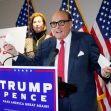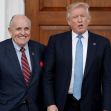Federal prosecutors in Manhattan tried to obtain search warrants last year for Rudolph W. Giuliani’s digital records. They were looking for electronic records about his pals with Ukrainian connections who helped him dig for mud to throw onto the Biden family, and with whom Giuliani was thought to have a mutually beneficial relationship. Giuliani was Trump’s personal lawyer at the time. Justice Department political leaders prevented the prosecutors from getting the warrant, which, in essence, left it to the Biden administration to pursue the records.
This refusal to grant a warrant may have minimal impact on the ongoing federal investigation of Giuliani. Prosecutors could just ask again.
As time passes, however, people’s memories can fade or shift, and documents could be destroyed. The case will present a test for Biden’s Justice Department: officials are trying to bifurcate the institution between legal and political matters, and restore the citizenry’s faith that it can uphold the law in an even-handed and unbiased way.
Giuliani’s lawyer said he thinks his client did nothing wrong, and Giuliani himself insists that his activities were “above board.”
In October 2019, federal prosecutors charged two Giuliani associates, Lev Parnas and Igor Fruman, with a money-funneling scheme. The scheme was allegedly to funnel foreign money to American politicians while supposedly trying to shape U.S.-Ukraine relations. The two men had been working with Giuliani to investigate Biden.
Giuliani was separately paid $500,000 for consulting work by a company Parnas co-founded.
People who are in-the-know about Giuliani’s case say that investigators were studying his consulting business and examining donations he made, primarily to America First Action, a pro-Trump super PAC. America First Action was set up after the 2016 election by Trump’s allies, advisors and friends. Crimes under investigation were the destruction or alteration of documents, foreign lobbying registration violations, aiding and abetting federal crimes, and foreign contributions to U.S. candidates.
Prosecutors decided they had probable cause to get a warrant to look at Giuliani’s communications by summer 2020. Knowing they were stepping into a politically sensitive area, Manhattan prosecutors approached the D.C. Justice Department leaders with requests for approval to move forward. They were denied.
One explanation proffered by someone familiar with the matter said that Justice Department policy and tradition prevent taking public steps in a case with potential electoral ramifications, and that the matter was refused because it was too near the time of the election. The Justice Department usually avoids aggressive investigative actions in the 60 days before the election if the actions could affect the outcome of the vote if made public.
Others said the prosecutors first approached senior officials in summer when those policies don’t apply, and that the Justice Department refused then, offering different objections.
In the closing months of 2020, prosecutors were still trying to determine whether Giuliani had illegally lobbied the Trump administration at the behest of Ukrainian oligarchs and officials who helped him search for dirt on Biden or his son. Giuliani denies any wrongdoing.
After the election, Manhattan prosecutors tried again, and once more, officials in the deputy attorney general’s office turned them down. Note that the request came during Trump’s election result challenges, and that Giuliani played a key role in those challenges.
Even during the post-election challenges, though, department leaders approved issuing a subpoena and taking other steps in a different sensitive investigation: that into Biden’s son Hunter.
Political appointees thought there was not enough evidence to charge Giuliani, but career officials involved felt there was reason to believe that a search would reveal evidence of a crime. That is the legal standard to get a warrant. But senior officials delayed until the Biden administration took over.
It’s unclear whether a warrant has been obtained since President Biden was sworn in.
Just how serious Giuliani’s legal jeopardy may be is uncertain. The fact of investigators wanting search warrants does not by itself suggest that he’ll be charged with a crime. Giuliani was not among the Trump pardonees. Giuliani said on his radio show before Trump left office that he didn’t need a pardon. “I don’t commit crimes,” he said.
Giuliani’s career has had quite the trajectory; once hailed as “America’s mayor,” widely praised for his post-9/11mayoral actions, and once a U.S. attorney, Giuliani left in the 1980s the same federal prosecutor’s office now investigating him.
While acting as Trump’s personal attorney and believing he could become Trump’s secretary of state, Giuliani conducted a separate consulting and legal practice, taking clients from all over the world. This was going on while he was a major influence inside the U.S. government.
Inside the Trump administration, Giuliani’s disparate activities raised alarms. Then-Attorney General William P. Barr advised Trump that Giuliani had become a liability. Trump didn’t distance himself from Giuliani, however, even as doubts intensified all around them.
Giuliani insists he kept his two roles separate.






